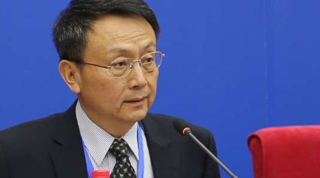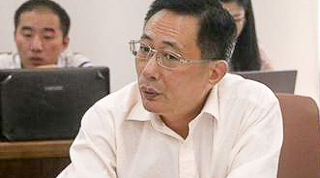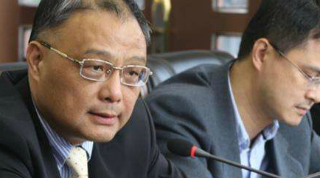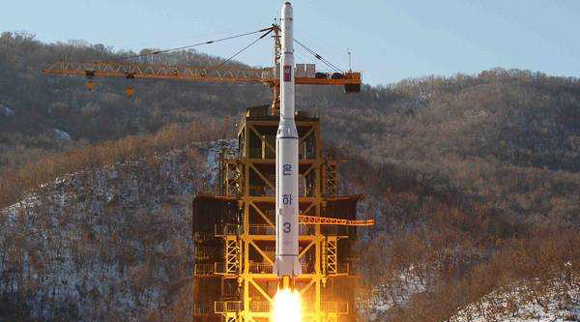China’s internal ‘Korean War’ intensifies as tensions rise on the peninsula.
a war of words
As rumbles from North Korea’s sixth nuclear test in September 2017 subsided, debate within China exploded into character assassinations and insults. Zhu Zhihua 朱志华 a little known scholar from the Zhejiang Association of International Relations savaged Jia Qingguo 贾庆国, prominent dean of the Peking University School of International Studies, for his proposal to start contingency planning talks with the US and South Korea, which ‘copy the US’ and ‘hint a military attack may be the next step’. Evoking the spectre of Cultural Revolution struggle sessions, he insinuated Jia held a wrong ‘political standpoint’. Jia hit back, calling Zhu a career public security officer who misrepresented his views. Scholars should not be treated as suspects, contended Jia, recommending the Zhejiang Association of International Relations replace Zhu. Zhu retorted that Jia’s US education had brainwashed him, suggesting relevant authorities examine his political background. Jia was eventually backed by the hawkish Global Times editor-in-chief Hu Xijin 胡锡进, and others arguing that differences of opinion over North Korea should not be politicised.
The Zhu–Jia face off is revealing. It shows red lines for public discourse continue to be redrawn: contingency planning is no longer taboo. Further, while critics of ties with North Korea have multiplied and become more vocal, conservatives have not yet given up the fight. Finally, the temperature in Beijing is rising to match Trump’s Twitter feed.
Zhu and Jia, reports Singapore daily Lianhe Zaobao, represent two distinct schools of thought on a nuclear North Korea’s security implications. On one front, a conservative ‘leftist’ school sees the US and South Korea using Pyongyang’s nuclear program as a pretext to reduce China’s strategic space. A more liberal ‘rightist’ school on the opposing front emphasises the threat North Korea poses to China, urging closer cooperation with the international community. While neither school is unified, their views regarding the origins and consequences of North Korea’s nuclear program are starkly divided.
debating North Korea
Within China’s highly controlled public sphere, open debate over North Korea demarcates what is possible in China’s foreign policy. Allowing Beijing to show its dissatisfaction with Pyongyang, it also serves as a barometer on internal contention between decision-makers. Following the first nuclear test in 2006, analysts began a public discussion that has become more raucous with every provocation, especially after Xi took power in 2013.
North Korea remains deeply divisive. The Zhu–Jia standoff, argues Hu Xijin, is merely the tip of the iceberg. Signs of division within the Party are also not unheard-of. After the first nuclear test in 2006, then-president Hu Jintao 胡锦涛 personally edited China’s public statement, as no other leaders dared take responsibility. Deadlock followed Pyongyang’s 2010 sinking of the Cheonan, a South Korean navy vessel. Internal disagreements were also reported during a three-day session of the Foreign Affairs Leading Small Group in 2009, after suggestions to cut oil and food supplies were rejected due to fears of regime instability. China’s ‘three nos’ (no war, no chaos, no nukes) policy emerged from the meeting, but that stance is now increasingly challenged.
a strategic liability
So-called ‘rightists’ view North Korea’s nuclear program as a threat to China’s security. Not only does it strengthen alliances between the US, Japan and South Korea, they say, it ramps up the risk of nuclear proliferation. Zhu Feng 朱锋, a prolific commentator on North Korea at Nanjing University, argues Pyongyang’s crazy provocations could be catastrophic for Northeast Asia. THAAD, he argues, is a direct result of the North Korean deadlock; Deng Yuwen 邓聿文 independent pundit and former deputy editor of Party journal Study Times, warns Japan too may deploy it. South Korea and Japan may even receive US go-ahead to nuclearise, says Yin Zhuo 尹卓 PLA Navy Research Centre senior fellow.
Chinese at home need to be more aware of the risks, argues Jia Qingguo, including nuclear accidents, North Korea selling nuclear technology to terrorist organisations or even reactivation of the Changbaishan volcano. China could itself become a victim of nuclear blackmail, adds Deng Yuwen. The possibility of Trump launching military strikes if current efforts fail is underestimated, warns Cao Shigong 曹世功 Korean peninsular expert. Cao argues the nuclear issue should not be confused with the wider relationship, and still believes in North Korea's value as a buffer. Most ‘rightists’ do not: Jia says that given the nature of modern warfare the strategic buffer is a thing of the past.
Conceding much has already been done, these ‘rightists’ argue for more pressure on Pyongyang Talks are not enough to contain North Korea, says Zhu Feng; Beijing must act decisively. Its current ‘dual suspension’ proposal does not change the status quo, thus benefitting North Korea, asserts Wang Peng 王鹏 Charhar Institute. Legal scholar Tong Zhiwei 童之伟 proposes revoking the Friendship Treaty with North Korea. Recognising North Korea as a nuclear state is a dead end,insists Cao Shigong.
Shen Zhihua 沈志华, a widely respected historian of the Korean War, made headlines in early 2017 when he called China’s alliance with North Korea ‘inherently contradictory’, rejected the official ‘three nos’ policy and suggested Beijing support peaceful reunification. Similarly critical voices have become far more mainstream recently, and this development paved the way for Jia’s suggestion to hold contingency planning talks.
targeting the real enemy
Conservatives like Zhu Zhihua see the US as the real threat. North Korea, they believe, is still a valuable strategic buffer. Viewing THAAD as a threat to both regional strategic stability and denuclearisation, they blame the US for the deteriorating situation. The US has no real interest in resolution, asserts Chen Fengjun 陈峰君 Peking University; it merely wants to maintain the Cold War status quo on the peninsula and step up its regional military presence. US–South Korean military exercises violate the spirit of UN resolutions and destabilise the peninsula, argues Li Dunqiu 李敦球 CASS Northeast Asia expert. Peace and stability should trump denuclearisation, he argues. Ling Shengli 凌胜利 China Foreign Affairs University says the US ‘wedge strategy’ aims to disrupt China’s ties with both North and South Korea.
This school has no faith in further sanctions. Completely cutting off oil supplies would make China the scapegoat for North Korea’s chaotic collapse, warns Zhu Zhihua. Beijing should, he advises, strengthen strategic coordination with Russia, ideally in the form of a trilateral dialogue with North Korea. To reduce Pyongyang’s sense of abandonment, Ling Shengli urges China to enhance its security pledges. Li Dunqiu advises incorporating mandatory THAAD removal into UN resolutions against North Korea.
Given China’s agreement to harsh UN sanctions, radically stepping up economic cooperation has become less of a focus for this group than in the past. Yang Xiyu 杨希雨, China Institute of International Studies and former participant in the six-party talks, admits there have to be opportunity costs for North Korea’s focus on nuclear rather than economic development. Many conservatives, however, continue to argue that further sanctions are ineffective (citing North Korea’s GDP growth) and stunt development in China’s northeastern provinces.
finding the keys
Who can ‘untie the knot’ on the peninsula? Officials repeatedly refute what they call the ‘China responsibility theory’, arguing tensions are US-induced. NPC Foreign Affairs Committee chair and former high-profile diplomat, Fu Ying 傅莹 says the key lies with the US: it must address North Korea’s security concerns to achieve denuclearisation. It should, conservatives argue, reduce North Korea’s security anxieties, stop inciting regime change and accept China’s ‘dual suspension’ proposal.
Liberally inclined scholars dispute this analysis, most vocally Zhu Feng. Without any change in North Korea’s system, he warns, the nuclear issue cannot be solved. Current uncertainty, he asserts, is a consequence of this system, not of geopolitics. Arguing the key lies with China, he suggests Beijing aim for gradual rather than sudden change within North Korea (a ‘soft landing’), though he concedes this will be difficult while Kim remains in power. While less explicit, other ‘rightist’ scholars also imply North Korea is mostly to blame for the current crisis.
time is up?
Given the rapid advance of North Korea’s nuclear capabilities, some argue it is time to accept reality. The only choice is between a friendly or hostile nuclear North Korea, argues Yan Xuetong 阎学通 Tsinghua University. Denuclearisation has become an ‘illusory goal’ and North Korea’s reasonable demands should be respected, says Qiu Meirong 邱美荣 Tongji University. Gao Cheng 高程 CASS adds Beijing should accept the status quo and cooperate with North Korea. No further UN resolution may be forthcoming, speculates Sun Xingjie 孙兴杰 Jilin University, arguing a changing course is the only option once 90 percent of North Korea’s foreign exchange is cut off. A grand deal is currently impossible, he adds, but freezing tests should be a focus.
restoring unity
The accusation that Jia is ‘echoing the US’ is symptomatic of a charged atmosphere. Divisions over North Korea could lead to social fracturing, warns Deng Yuwen. Several observers warn against foreign influences. Ling Shengli accuses the US of intensifying splits by putting public pressure on Beijing. Wang Peng, however, warns North Korea could tear apart Chinese society by equating support for its nuclear program with support for its socialist system, and in extension for China’s own. Trying to defuse the situation, Hu Xijin urged all to reject US, North and South Korean attempts to influence China’s internal debate.
implications
Actual policy straddles both camps, notes Lianhe Zaobao: opposing both Pyongyang’s nuclear program and use of force. Beijing’s position reflects the more critical trend mentioned above. During Xi’s first term in office, pressure on North Korea has markedly increased, recently especially so, and at a high price in bilateral ties. The announced ban on textile imports and closing of joint ventures has made language of ‘normal trade ties’ redundant. Meanwhile, Beijing sidesteps taking ownership of the issue, publicly pointing its finger at the US. Rising regional tensions and an expanded sanctions regime make Beijing’s choices increasingly fundamental. Rising domestic tensions over them should come as no surprise.
Xi’s policy of incrementally increasing pressure is likely to continue, possibly taking up Jia’s suggestion on contingency planning. The makeup of the new Politburo Standing Committee (PSC) may give Xi more space for manoeuvre in his second term. Zhang Dejiang 张德江 NPC Standing Committee Chairman and third-ranked PSC member, studied in Pyongyang in the 1970s and has long been rumoured to hold some influence over North Korea policy. His retirement could mean Xi will dominate Beijing’s approach even more than he has done so far. If true, this might be better news for Jia Qingguo than Zhu Zhihua.
profiles

Jia Qingguo 贾庆国 | Peking University School of International Studies dean
China’s security is seriously undermined by a nuclear North Korea, insists Jia. Chances of a crisis are far higher than before, he believes, due to the increased frequency of nuclear tests, North Korea achieving the capability to reach the US with nuclear weapons, and rising likelihood of internal power struggles as Pyongyang incurs harsher sanctions. With a PhD from Cornell University, Jia is a leading scholar on Sino–US relations and a member of the Standing Committee of the China Democratic League, one of China’s eight legally recognised political parties.

Li Dunqiu 李敦球 | Chinese Academy of Social Sciences Korean peninsula expert
Former director of the State Council’s Office of Korean Affairs, Li is one of a declining group for whom North Korea remains a strategic asset. Ethnically Korean, he won international notice with a 2014 Global Times op-ed that was fiercely attacked by retired PLA general Wang Hongguang 王洪光 who insists Beijing’s and Pyongyang’s interests no longer coincided (Beijing was ‘not North Korea’s saviour’). For Li, abandoning North Korea would advantage the US and threaten China’s security. Beijing should instead strive to ‘maintain balance’ on the peninsula. THAAD only destabilises the area, Li believes, urging its removal be incorporated in UN resolutions against North Korea.

Zhu Feng 朱锋 | Nanjing University School of International Relations dean
An internationally recognised foreign policy scholar and former Peking University professor, Zhu now heads a South China Sea think tank in Nanjing. A major critic of ties with North Korea, he highlights the cost to China’s security environment and global role, and the risk of accidents. While policy has moved, Zhu argues more pressure is needed. China’s continued support can mainly be explained, Zhu argues, by North Korea’s value as a security buffer (fearing a unified Korea with US forces and spillover from North Korean instability).

Shen Zhihua 沈志华 | East China Normal University Centre for Cold War International History Studies director
Suffering serious setbacks to his early career, not least trumped-up political charges during the Cultural Revolution, Shen turned his hand to business and amassed a fortune. Investing C¥1.4 million in declassified Russian historical archives in 1995, he launched a six-year project (1996–2002) with CASS and now directs the Centre for Cold War International History Studies at East China Normal University. North Korea’s decision to go nuclear, he argues, is rooted in its strategic isolation after losing the nuclear umbrella provided by the Soviet Union and China and a sense of betrayal after China established relations with South Korea. He continues to subject official views, not least Beijing’s proverbial ‘teeth and lips’ relationship with North Korea, to sceptical fact-checking.
